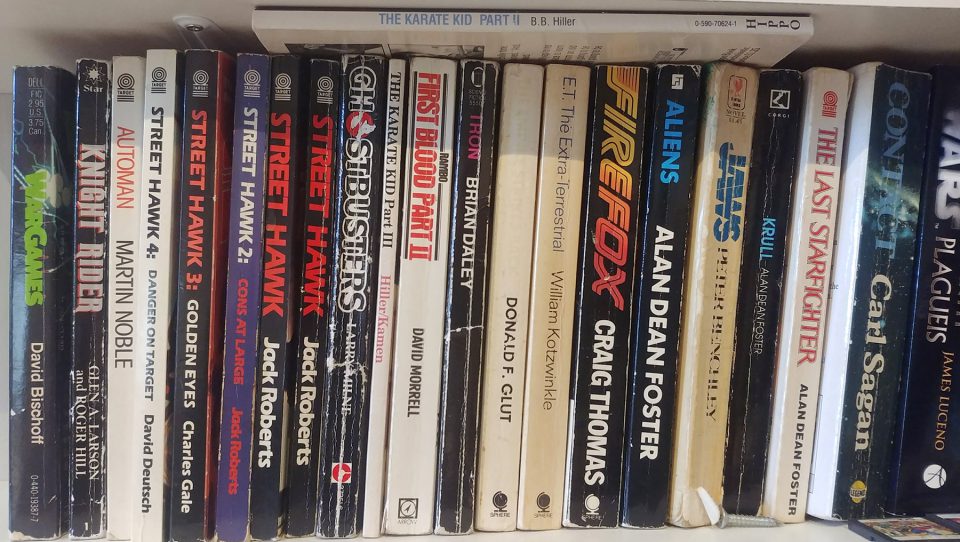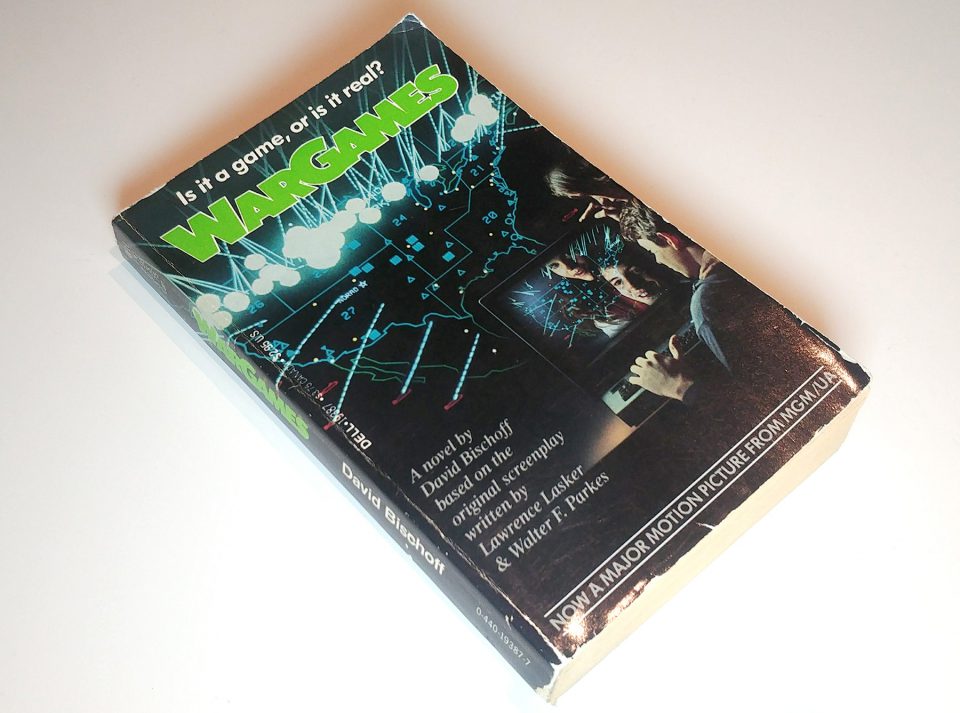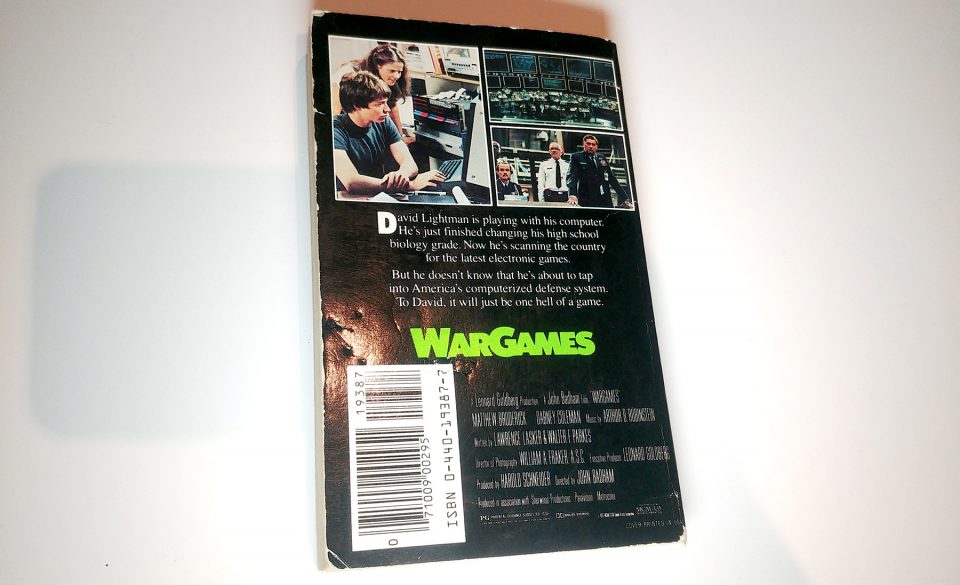I’ve been slowly building up a collection of movie novelisations. But the trouble is I often really struggle to find time to read books. My commute time is often taken up with work or watching Netflix (which I tend to prioritise over books) and books just fall down the list of priorities. When I get into a good book I do love it though. For example I read all the Game of Thrones books in a few months, before I started watching the TV show a few years back. But I’ve yet to really bust into my growing collection of TV and movie novelisations, which you can see below. There are a few crackers in there that I would love to read soon.
Part of my reason for starting to make a dent in this pile of books was because of being inspired by Paxton Holley from the Cavalcade of Awesome blog and the Nerd Lunch podcast and Cult Film Club podcast. He is a book machine. He ravages through several books a month. I really don’t know how he does it, with young children and also fitting in training for marathons. Pax recently started the awesome mini podcast called I Read Movies where he compares a movie novelisation with the movie itself and highlights any differences. I strongly urge you to have a listen if you have any interest in movie novelisations, or even just movies in general. You can garner the interesting bits from Pax’s podcast without actually having to read the book yourself!
One of the things I really love about movie novelisations is that often you get some expanded history on a few of the characters, or some more in-depth descriptions of particular scenes, as the author wants or needs to flesh things out. But also, the more interesting part for me is that often you get deleted scenes or alternate takes described in the books. This is often because the author was given an early draft of the script or screenplay and they had to work off that, and some of that story might have been changed in a rewrite or left on the cutting room floor. Sometimes you can tell that they knew who the actors were going to be but other times it’s plain they didn’t. I enjoy this little alternate look at some of the movies we love, and that’s exactly what Pax highlights in his podcast.
So I managed to get my backside in gear and finally read one of the books. And there was no question what my first book was going to be. My favourite all time movie is WarGames so I had to go for that one. Here are my thoughts, in simple bullet form.
WarGames novelisation
- I believe it’s based on the original screenplay, so I was hoping there would be some bits that didn’t make either filming or the final edit.
- There was an extra chapter near the start about David dealing with his dad and being a recluse. This is the sort of extra backstory that I find interesting in novelisations.
- There was an extra bit about McKittrick and Pat Healey having an affair in a hotel. This was extremely interesting as it was never clear in the film if they were together and/or were husband and wife. Falken makes the comment in the film about McKittrick’s wife still picking his ties for him, and Pat Healey puts McKittrick’s gum in her mouth at one point (which I always found gross), so I was never quite clear if Pat was his wife or not. Good to have that cleared up!
- The government guys don’t fly in on a helicopter in the book.
- David Lightman is reading the novel “Day of the Dragonstar”. I checked and that book exists and was published in 1983 by the same author, David Bischoff. Good for him that he got to plug his own book in this novelisation!
- One of the most iconic shots of the film for me is David playing Galaga on the arcade. But I was surprised to read that in the book he is actually playing Missile Command first and then Pac-Man. I wonder if that was in the original screenplay or if the author had some gaming knowledge and changed it up. I do know that Matthew Broderick was given a Galaga machine to practice on for a few weeks before the shoot, so it can’t have been a last minute change. Jennifer also says she can get 30,000 on Pac-Man which is interesting to know that she enjoys some games too.
- The password isn’t just ‘joshua’. It’s ‘Joshua5’. In the film he suddenly twigs that the secret password might be named after his son and it works right away, but in the book it’s slightly trickier.
- It was very interesting to read General Berringer’s character being more fleshed out. We got more info about Berringer like his disappointment about his son who didn’t enlist in the army. This stuff all really helps you to understand the characters more. It will be interesting to watch the film again knowing some of these backstories.
- Before David gets arrested he has a chat with a shop clerk. He says David has a rep as being a good arcade player. That’s pretty cool, being ‘known’ in the area as a good arcade player.
- The FBI arrest that happens outside the shop appears to be much more brutal and rough than in the film.
- It mentions again later in the book that McKittrick is cheating on his wife.
- There is a much bigger tour of the computers that McKittrick gives David. Obviously in a book you can have expensive sets but in movies you often have to scale back.
- Some of the descriptions of McKittrick sound like the author had seen the film. Perhaps he just knew that Dabney Coleman would be in the role. But there was a lot written that wasn’t in the film or had slightly different dialogue. This is the sort of thing that I never know if it is the author going off-piste, or if they were working off an earlier version of the script. When you read the character saying the exact words from a script that you know so well you can really hear their voice in your head. But when the words change slightly it can feel quite strange.
- In the book, it says that Falken lives on Anderson Island, not Goose Island as in the film. I believe they filmed on Anderson Island, Washington in real life. But in the film it’s called Goose Island, Oregon.
- Some bits are very different from the film. Such as adding a bit about him on the plane flying to Falken’s house and then more talking between him and Jennifer. Are they on a bus? I wasn’t quite sure. The commentary on the DVD actually says they cut out a scene of them on a bus talking about being spies.
- It’s weird that in the book Falken had a ping pong table and pool tables in his house on a remote island. Doesn’t strike me as the entertaining type. Falken also seemed much more eager to listen to them than in the film. Interestingly the DVD commentary talks about the writers originally writing Falken as a darker character.
- There is a great little speech by David at Falken’s house on p165 at the very bottom of the page. I wonder why this wasn’t used in the film, if it had been in the original script, or perhaps the author added it himself… [David walked over and turned off the VCR. “We’re not dinosaurs, Dr. Falken. We’ve got some free choice. Look, I admit that I was a jerk – a real jerk – for insisting on playing with your program. I’ve learned my lesson, believe me. But I didn’t give up, Dr. Falken. I didn’t just sit there in the middle of that mountain, even though nobody listened to me. You really think you’re better than McKittrick? You see Dr. Falken, futility was my problem too. I felt my life was futile… and I looked to computers to give me meaning, purpose… power. But I was wrong… so wrong, and I realize that now. And God damn it, I’m trying to do something about it, not sitting around feeling superior with my thumb up my ass”.]
- When General Barringer is calling round the three first points of impact to see if the men are still on the line, it says that “Airman Doughterty was suddenly of aware of moisture creeping down his legs. He looked down in horror to realize that he’d wet his pants.”. I’ll never be able to watch the film again without thinking of poor Airman Doughterty wetting his pants.
- At the end it’s not the same as the movie. In the film Tic-Tac-Toe doesn’t get listed immediately but David just asks Joshua to play it. In the book Falken has to suggest typing GAMES and then Snake, Tic-Tac-Toe and Hopscotch get listed!
- Joshua doesn’t get most of the launch codes when they’re playing Tic Tac Toe. And there isn’t much celebrating when he learns and stops playing the game. This ending does feel quite different from the film.
- There’s quite an interesting epilogue, which doesn’t exist in the film at all, where the teacher commends David and tells him they are starting computer classes. But the unrealistic bits perhaps are that A) the teacher got a Missile Command arcade into the school but also B) David would rather go to aerobics class instead and he ends the book walking away from an arcade whilst whistling Let’s Get Physical! I guess they’re saying that the whole NORAD thing scared David off from playing games. Still feels a bit of a random ending though, but a part of me would have quite liked to have seen that play out in the film.
If you know any other tidbits of information about WarGames or its novelisation please let me know in the comments!




